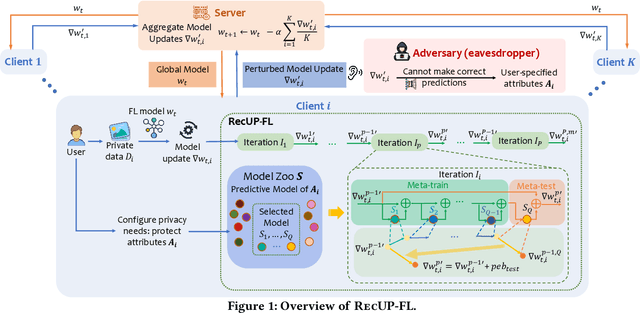Syed Irfan Ali Meerza
EAB-FL: Exacerbating Algorithmic Bias through Model Poisoning Attacks in Federated Learning
Oct 02, 2024



Abstract:Federated Learning (FL) is a technique that allows multiple parties to train a shared model collaboratively without disclosing their private data. It has become increasingly popular due to its distinct privacy advantages. However, FL models can suffer from biases against certain demographic groups (e.g., racial and gender groups) due to the heterogeneity of data and party selection. Researchers have proposed various strategies for characterizing the group fairness of FL algorithms to address this issue. However, the effectiveness of these strategies in the face of deliberate adversarial attacks has not been fully explored. Although existing studies have revealed various threats (e.g., model poisoning attacks) against FL systems caused by malicious participants, their primary aim is to decrease model accuracy, while the potential of leveraging poisonous model updates to exacerbate model unfairness remains unexplored. In this paper, we propose a new type of model poisoning attack, EAB-FL, with a focus on exacerbating group unfairness while maintaining a good level of model utility. Extensive experiments on three datasets demonstrate the effectiveness and efficiency of our attack, even with state-of-the-art fairness optimization algorithms and secure aggregation rules employed.
GLOCALFAIR: Jointly Improving Global and Local Group Fairness in Federated Learning
Jan 07, 2024



Abstract:Federated learning (FL) has emerged as a prospective solution for collaboratively learning a shared model across clients without sacrificing their data privacy. However, the federated learned model tends to be biased against certain demographic groups (e.g., racial and gender groups) due to the inherent FL properties, such as data heterogeneity and party selection. Unlike centralized learning, mitigating bias in FL is particularly challenging as private training datasets and their sensitive attributes are typically not directly accessible. Most prior research in this field only focuses on global fairness while overlooking the local fairness of individual clients. Moreover, existing methods often require sensitive information about the client's local datasets to be shared, which is not desirable. To address these issues, we propose GLOCALFAIR, a client-server co-design fairness framework that can jointly improve global and local group fairness in FL without the need for sensitive statistics about the client's private datasets. Specifically, we utilize constrained optimization to enforce local fairness on the client side and adopt a fairness-aware clustering-based aggregation on the server to further ensure the global model fairness across different sensitive groups while maintaining high utility. Experiments on two image datasets and one tabular dataset with various state-of-the-art fairness baselines show that GLOCALFAIR can achieve enhanced fairness under both global and local data distributions while maintaining a good level of utility and client fairness.
RecUP-FL: Reconciling Utility and Privacy in Federated Learning via User-configurable Privacy Defense
Apr 11, 2023



Abstract:Federated learning (FL) provides a variety of privacy advantages by allowing clients to collaboratively train a model without sharing their private data. However, recent studies have shown that private information can still be leaked through shared gradients. To further minimize the risk of privacy leakage, existing defenses usually require clients to locally modify their gradients (e.g., differential privacy) prior to sharing with the server. While these approaches are effective in certain cases, they regard the entire data as a single entity to protect, which usually comes at a large cost in model utility. In this paper, we seek to reconcile utility and privacy in FL by proposing a user-configurable privacy defense, RecUP-FL, that can better focus on the user-specified sensitive attributes while obtaining significant improvements in utility over traditional defenses. Moreover, we observe that existing inference attacks often rely on a machine learning model to extract the private information (e.g., attributes). We thus formulate such a privacy defense as an adversarial learning problem, where RecUP-FL generates slight perturbations that can be added to the gradients before sharing to fool adversary models. To improve the transferability to un-queryable black-box adversary models, inspired by the idea of meta-learning, RecUP-FL forms a model zoo containing a set of substitute models and iteratively alternates between simulations of the white-box and the black-box adversarial attack scenarios to generate perturbations. Extensive experiments on four datasets under various adversarial settings (both attribute inference attack and data reconstruction attack) show that RecUP-FL can meet user-specified privacy constraints over the sensitive attributes while significantly improving the model utility compared with state-of-the-art privacy defenses.
 Add to Chrome
Add to Chrome Add to Firefox
Add to Firefox Add to Edge
Add to Edge